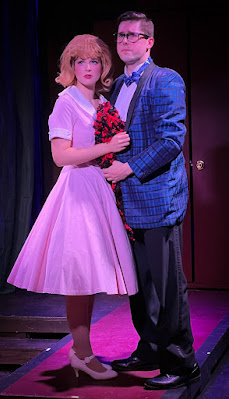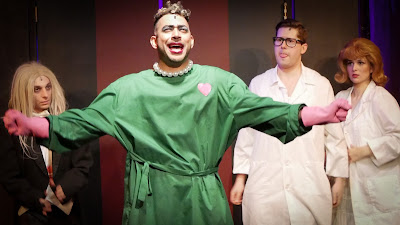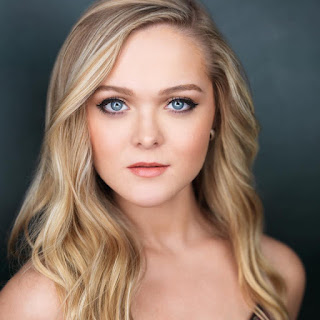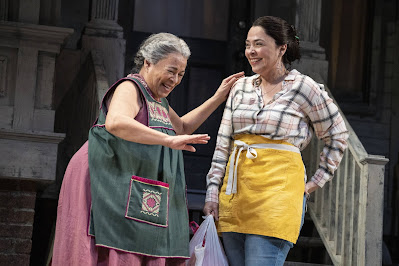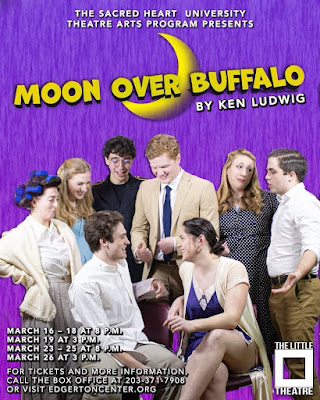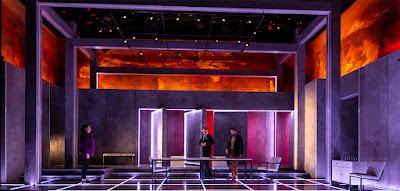By James V. Ruocco
The book - the brainchild of Richard O'Brien - who also wrote the catchy music and lyrics including the quick-witted, cheeky showstopper "The Time Warp," is not for the faint of heart oy anyone who buys a ticket thinking this musical is G-rated, sweet and syrupy hokum where boy-meet-girl, homosexuality is taboo and everyone lives happily ever after.
You'll find none of that here.
O'Brien's blueprint for "The Rocky Horror Show" dishes up schlock-horror bits involving transvestitism, homosexuality, oral sex, masturbation, ejaculation, all-American sweethearts, sci-fi lunacy, 1950's rock and roll, Steve Reeves muscle films, flying saucers, rainstorms, gothic mansions, fishnet stockings, 1970's glam, ruby red lipstick, party anthems and tight-fitting underwear.
It's dated, spatted, diced and sliced with Halloween embedding and a breezy, often crazy pop culture musical score vying for audience participation, which, depending on the performance, and the crowd itself, can blow the roof off the venue on which the musical is housed.
Time-warping its way into the immersive stomping grounds of Music Theatre of Connecticut, "The Rocky Horror Show" - performed entirely in flashy, moody, living Technicolor by an entire Equity cast of performers - crash, bangs and wallops across the MTC stage with such wild, rip-roaring abandon, its carnival like atmosphere harkens moments that recall the B-movie kitsch of Roger Corman, Roy Del Ruth and Edward Bernds, the avant-garde fantasy of Italian filmmaker Federico Fellini and the crypto cheesiness of television's "Flash Gordon," "Space Patrol" and "Atom Squad."
Then again, that's the point of this cultish musical, isn't it?.
Inspired.
Delicious.
Physical.
Rhythmic.
Frivolous.
Bizarre.
There's nothing time warped about it.
As lensed through the eyes of director Kevin Connors, it is upfront, salacious and sexual and so much more than simply "just another show."
It's an experience - all in good fun - coming from an era where sexual liberation and sexual orientation were bubbling over in mostly R-rated and X-rated ways.
The story - which, pretty much everyone knows including devoted audience members who turn up dressed in costume or in drag as their favorite characters, goes something like this.
Following the show's opening musical number "Science Fiction Double Feature," all-American boy-girl couple Brad Majors and Janet Weiss seek refuge in the middle of nowhere (their car breaks down during a rainstorm) at the Transylvanian castle of Frank-'N' Furter, a mad scientist and transvestite from the planet Transsexual whose lust for both handsome men and attractive women finds him back in the laboratory where he creates a muscle-bound hunk named Rocky for use as his own companion, bedmate and sexual plaything.
That's not all.
As penned by the thrill-seeking O'Brien, the story overflows with plenty of other crazies that include Frank 'N' Furter's trusty, live-in butler Riff Raff; his oversexed sister Magenta; a shapely and sexy groupie named Columbia; and perplexed, put-upon, overbearing Eddie, the unfortunate victim of a botched-up delivery that leads to some very troubled circumstances via a wielding chainsaw.
In short, blood and guts everywhere.
Also, along for the ride are a smiling and smarmy Narrator who addresses the audience with playful tidbits and remarks about the pending action; two usherettes and two phantoms who pop in and out of the story; and the wheelchair bound Dr. Everett Scott, the paraplegic science tutor Brad and Janet had hoped to visit at the start of the story.
Puzzling out and comprehending the very meaning of "The Rocky Horror Show" and its absurd, sci-fi/horror bouts of fantasia, gay sex, imagined incident, cross-dressing, alluring musicality and unapologetic traditions and values, director Kevin Connors comes to the project with a deeply visceral connection and commitment that allows the two-act musical to soar and resonate with full-orbit conviction, gallop and time-honored idiosyncrasy.
As director, his incarnation of the popular musical hits the stage with plenty of buzz, bite, zing, swathe, tilt and snap. It's daring. It's dirty. It's obscene. It's devious. It's taboo. It's queer. It's orgasmic. It playful. Moreover, Connors lets it run wild without any form of censorship or hesitation.
No sugar-coating. No pandering. No tricks. No games. No pauses. No sarcasm. No sweetness. Here, strangeness and beauty go hand and hand alongside egged on frivolity, drag and double act bubble and brew. It's also mixed flavorfully with paint-brush glitter and gleam and absolutely no shortage of ideas and gallop.
In its favor, the immersive intimacy of MTC's playing space gives the musical a voyeuristic closeness between actor and audience that provides a three-dimensional thrust and dimension that would be impossible to replicate on a large proscenium stage. That concept played out to full advantage by Connors brings additional energy and sneer to the project, enlivened by in-the-moment infusion, weirdness, over exaggeration and retro charm and entrapment.
Musically, "The Rocky Horror Show" makes its mark with a liberating, enthusiastic, frenzied musical score designed to showcase the impressive voices of the stellar cast, their commanding turns throughout the page-turning story and the production's giddy, over-the-top sci-fi/horror movie conceit.
As penned by O'Brien, there are sixteen musical numbers - witty, wacky, character defining - all carefully synced and interspersed throughout the ongoing story, which in this go-round is fueled by lots of rattle, roar and vigilant, crisp, musicality and efficiency.
They are: "Science Fiction, Double Feature," "Dammit Janet," "Over at the Frankenstein Place," "The Time Warp," "Sweet Transvestite," "The Sword of Damocles," "I Can Make You a Man," "Hot Patootie," "I Can Make You a Man (reprise)," "Touch-A, Touch-A, Touch Me," "Once in a While," "Eddie's Teddy," "Planet Schmanet-Wise Up Janet Weiss," "Floorshow/Rose Tint My World," "I'm Going Home, "Superheroes" and "Science Fiction/Double Feature (reprise)."
For this MTC production, the kitschy, tongue-in-cheek, underground-inspired music composed and conceived by O'Brien is brought vividly to life by musical director Tony Bellomy (conductor/keyboard 1) and the orchestral team of Max Caserta (guitar), Rodney Loren (keyboard 2), Nick Devito (woodwinds), Alan Lounsbury (bass guitar) and Michael Blancaflor (percussion). Well attuned to the musical's craziness and reinforced, oozy, wild abandonment, Bellomy and company deftly illustrate the score's emotional snap and intensity, its quirky connections, its contoured floating and its playful, rhythmic energy and B-movie thrust and coherence.
As "The Rocky Horror Show" evolves, there's also a lot of refreshing, earthy spontaneity at hand completely in sync with the musical's topsy-turvy machinations, its tilt and spin exuberance, its butter popcorned melody and its harmonic sprite and twinkle. Elsewhere, there's a newness to the melodic shape and color of the material, which, in turn, heightens the score's uncanny sense of high camp, its orchestral dizziness and its naughty, persuasive, sexual overtones, ethos and its drug-induced euphoria.
Casting is key to the success of any "Rocky Horror Show" production and at MTC, Connor fills that stage of his intimate venue with a dream cast of performers, all of whom are well-suited for each of the particular roles they are asked to portray. All eleven gleefully embrace the show's flashy, B-movie plotting, its sci-fi stylization, its campiness, its full-throttle sexuality, its infamous one-liners, its songs, its dialogue, its dances and its welcomed enthusiasm from the audience.
In the lead role of the cross-dressing, oversexed, full-on transvestite Frank 'N' Furter, Justin Johnston is incredibly impressive and iconic bringing lots of drag show swirl and twirl to the part but never once copycatting others who have played the role before him including Tim Curry, David Arquette and Tom Hewitt. It's a fresh, raw, invigorating spin that never falters for a moment. Cast in the role of the show's Narrator, Jim Schilling is absolutely "spot on," filling the shoes of the musical's storyteller with a "Harry Potter" like flair, magic and a real sense of belonging. Jeff Raab's scene-stealing, crazed portrayal of Riff Raff, a strange and spooky Transylvanian, based, in part on "Frankenstein's" servant Igor, is outrageously campy, wicked and hugely entertaining. As Rocky, the muscle-bound Herculean creation of Frank 'N' Furter's creation, Domenic Servido is body beautiful perfect for a role steeped in narcissistic B-movie kitsch and gleam designed to make everyone on stage drool uncontrollably along with every housewife, homosexual and horny teenager in the audience. John Treacy Egan is a powerhouse of talent, song and characterization in the dual roles of Eddie and Dr. Everett Scott.
As Brad Majors, Michael Luongo offers a standout turn as the all-American innocent whose sweetness is immediately corrupted once Frank 'N' Furter, pretending to be Janet, seduces him with sexual acts that he admittingly seems to enjoy. It's a role he plays to perfection, matched by a polished vocal range that reveals a melodious pop fusion and range that turns every one of Brad's songs into genuine showstoppers. Skye Gillespie, in the role of the naïve Janet Weiss, brings happy-ending sparkle and personality to her ingenue role along with a strong sense of commitment and confidence that makes every one of her scenes stand out whenever she's on stage. Musically, her vocal ability and charm is beautifully layered with thrilling emotional inspiration and uplifting pop and groove. There's also a knockabout vitality and honesty to her characterization which adds a certain freshness and dynamic to her on-stage romance with Luongo's Brad.
Leigh Martha Klinger, cast in the role of Riff Raff's crazy sister Magenta, commands the MTC stage with a wildly entertaining, sci-fi appropriate performance of dash, humor, sexiness and sugar rush adrenaline. As Columbia, a groupie with a flair for the dramatic (her big revelatory moment in Act II is a bona fide showstopper), Hillary Ekwall, sizzles and snaps with decided purpose and inspired gamboling. Dressed in drag queen garb reflective of "Cabaret's" Liza Minnelli, Stephen Petrovich's Phantom 2 oozes plenty of Kit Kat Klub electricity and 1950's sci-fi allure.
Brianna Bauch, as "Rocky Horror Show's" welcoming usherette (she starts the show with a dazzling superstar rendition of "Science Fiction Double Feature," shared with the equally dynamic Leigh Martha Klinger) pushes positivity to sheer delight with a celebrated musical turn that will no doubt lead to starring roles in several musicals including "Cinderella," "My Fair Lady," "Frozen," "Carousel," "Fiddler on the Roof" and "Hello, Dolly!"
Quite a contribution - and one that bespeaks real authenticity.
Photos of "The Rocky Horror Show" courtesy of Joe Landry.
"The Rocky Horror Show" is being staged at Music Theatre of Connecticut (509 Westport Ave., Norwalk, CT), now through April 8, 2023.
For tickets or more information, call (203) 454-3883.
website: musictheatreofct.com


